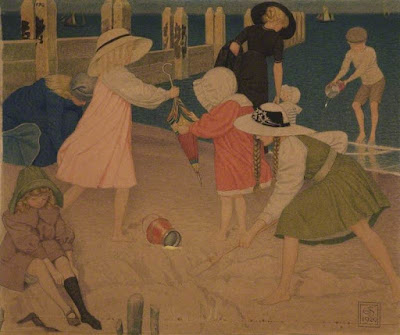Children and Smartphones
According to Ofcom, half the nine-year-olds in Britain own a mobile phone. By the age of 12, virtually all have one. Somewhat incredibly, about a fifth of three to four year olds also have a phone - that's about 300,000 very young children.
The lives of young people have changed radically in the past decade, since smartphones became ubiquitous. Many report spending about seven hours a day online, turning their daily activities into Instagram and Snapchat content and following trends on TikTok. One persuasive writer and campaigner on this issue, Jonathan Haidt, has described what has happened as a "transition from a play-based childhood ... essential for overcoming fear and fragility, to a phone-based childhood which blocks normal human development by taking time away from sleep, play and in-person socialising, as well as causing addiction and drowning kids in social comparisons they can't win."
 |
| Children at Play Joseph Edward Southall (1861-1944) Photo Credit: Victoria Art Gallery [CC BY-NC-ND] |
In the same period, there has been a dramatic increase in the incidence of mental health issues among teenagers and young adults, including anxiety, depression and self-harm...
The pioneers of digital technology always knew its effect on young brains could be negative. People such as Bill Gates and Steve Jobs famously restricted their children's access to smartphones. And as long ago as 2017, Jean Twenge, an American psychologist, asked, "Have smartphones destroyed a generation?" But proving this has been a struggle and has delayed necessary action. People use social media in very different ways, often with positive benefits, keeping in touch with friends or learning, so the evidence that overuse is linked to mental health is never going to be as straightforward as proving the link between, for instance, smoking and cancer in the 1950s...
Yet no one has ever come up with an alternative explanation for why the state of mind of vast numbers of young people would so suddenly change, coinciding exactly with the rise of the smartphone, in widespread countries and with no correlation at all with economic or political events...
Analysis of the UK Millennium Cohort Study links greater social media use with online harassment, poor sleep, low self-esteem, poor body image and higher symptoms of depression. In March, figures in the US showed 30 per cent of teen girls considered attempting suicide in 2021, up from 19 per cent a decade earlier...
In one case in Ireland, an entire town has agreed not to give phones to their children before secondary school age... Policies on smartphone use in individual schools could be strengthened with a national ban... This is a silent epidemic, and we should not fail to act.
(William Hague, The Times, 2023)
What is this life, if full of care,
We have no time to stand and stare.
No time to stand beneath the boughs
And stare as long as sheep or cows.
No time to see, when woods we pass,
Where squirrels hide their nuts in grass.
No time to see, in broad daylight,
Streams full of stars, like skies at night.
No time to turn at Beauty's glance,
And watch her feet, how they can dance.
No time to wait till her mouth can
Enrich that smile her eyes began.
A poor life this, if full of care.
We have no time to stand and stare.
(William Henry Davies)
Comments
Post a Comment